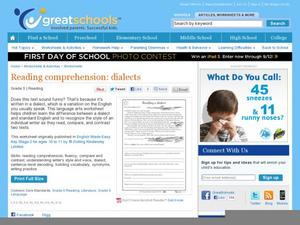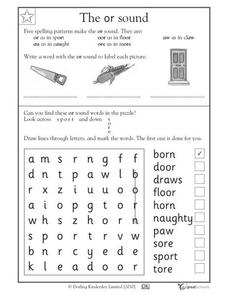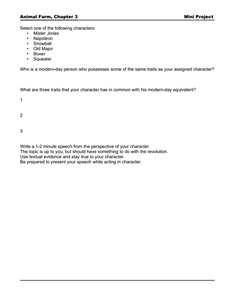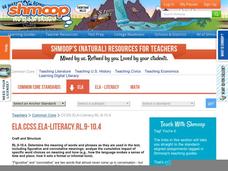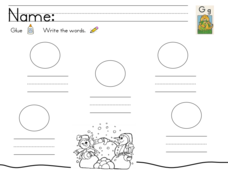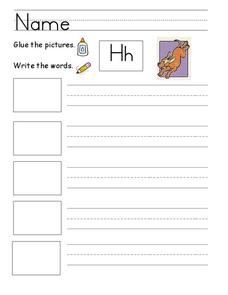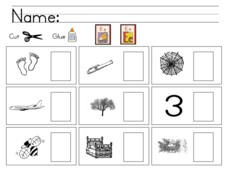K5 Learning
Why Does the Ocean have Waves?
Six short answer questions challenge scholars to show what they know after reading an informational text that examines waves—what they are, what causes them, and how different Earth factors affect their size and strength.
K5 Learning
The Merchant's Caravan
Scholars show what they know about a reading passage, The Merchant's Caravan, by way of four short answer questions designed to reinforce reading comprehension skills.
K5 Learning
Grace Darling
Scholars read about a courageous young girl named Grace and her fearless act to save sailors at sea. Then, test their reading comprehension by way of four short answer questions.
Nosapo
Family Titles, Pronouns, Writing about a Person
How is your grandmother related to you? How is your cousin related to your grandmother? Learn about family relationships and pronouns with an activity that guides pupils to write two short narratives about members of their families.
Prestwick House
Ten Days to A+ Grammar: Verbs
What are you doing today? What have you done this week? What will you be doing next month? Focus on verb usage with a series of fill-in-the-black exercises on basic tenses, inappropriate shifts in tense, and active and passive voice.
Curated OER
Test Your Speaking & Listening Skills
Learners match 15 Derbyshire slang phrases with their meanings. When it comes to distinguishing the contexts for formal and informal English, any time you'd use this language, the context is definitely informal.
Curated OER
Simile Practice
Inspire creative writing by studying similes. This sheet provides learners with 10 different topics, and they must create a simile for each topic. Example topics include: favorite teacher, the waterfall, a parrot, the first day of...
Curated OER
What is a Metaphor?
The use of metaphors really paints a picture in the reader's mind. Get your class using metaphors in their writing by studying them first. This learning exercise has four simple metaphors, and the reader must identify which two things...
Curated OER
Homophones: Fun with Puns
What is a homophone for aloud? Or right? Fifth graders complete a list of 24 homophones, choosing another word that sounds like a given word but has a different meaning. At the bottom of the page, they write punning sentences to practice...
Curated OER
Statements and Questions
Teach your class the differences between statements and questions with a simple activity. After reading four statements, third graders rewrite the sentences as questions. They do the opposite in the last section. A helpful activity for...
Winterhill School
Poetry Analysis
Gain greater insight into poems using a poetry analysis worksheet. Here, scholars follow steps and answer questions to dissect any poem. Topics include the poem's meaning, theme, technique, and structure, as well as personal thoughts and...
Curated OER
Reading a Dialect
Reading a dialect can be difficult; show readers that it can also reveal fascinating details! They read two extracts from Jane Gardam's The Hollow Land, which is written in a British dialect. Readers answer comprehension questions,...
Ohio Literacy Resource Center
Arguing with Aristotle Ethos, Pathos, Logos
Introduce your classes to the Art of Rhetoric with a lesson that focuses on Aristotle's persuasive appeals and how they have been used, both ethically and unethically, to influence opinion.
Curated OER
So & So That
When do you use "so" or "so that"? Practice this skill with your ESL students in this worksheet, which includes twenty multiple-choice questions. Each question prompts English learners to choose the correct way to complete the sentence.
Curated OER
Connectors Exercise: Transitional Words
Transitional words and phrases make writing smooth and ease oral fluency. This resource gives English learners a chance to practice using common connecting words and phrases like above all, firstly (sic), instead, etc. Answers are...
Curated OER
Poems: "The Rabbit"
In pairs or on their own, fourth graders read the poem, "The Rabbit." They then answer eight critical-analysis questions, requiring them to make inferences, and interpret the poem's meaning and use of language. The reading passage,...
Curated OER
Poems: Identifying Patterns
Here is a great worksheet that contains two short poems to compare and contrast. Children will read each poem out loud and then complete three comparative analysis questions which focus on rhyme, structure, and language. Note: The...
Curated OER
The or Sound
Before using this vowel sounds crossword activity, be forewarned that the pronunciation here is based on British English, and will be confusing for American English speakers. Learners focus on the /or/ sound, examining five spelling...
Curated OER
Animal Farm Chapter 3 Discussion Notes and Mini-Project
Created for a 10th grade English classroom studying George Orwell's Animal Farm, this mini-project promotes exploration of character and plot. In the first section, young readers are required to characterize one character from the story,...
Shmoop
ELA.CCSS.ELA-Literacy.RL.9-10.4
The fourth standard for reading literature in the Common Core calls for young readers to be able to determine the figurative and connotative meanings of words and phrases. Use this resource, a continuation of a series of Common Core...
Kelly's Kindergarten
Kelly's Kindergarten: G Words
Good golly! Practice the letter G with a worksheet that prompts kids to cut, glue, and write. After finding the pictures that use the letter G, kids glue them in the correct places and write the words underneath
Kelly's Kindergarten
Kelly's Kindergarten: H Words
Help your hardy learners with a handy learning exercise! Kindergartners review a series of pictures, and cut out the correct ones to glue onto the learning exercise. They then write the word.
Curated OER
Kelly's Kindergarten: L Words
Learn a lot with lists of letters! Park the correct trucks into their parking spaces with a activity that focuses on the letter L. After kids study the signs next to six parking spaces, they match the words on the trucks that include the...
Curated OER
Kelly's Kindergarten: Long/Short E
Kindergartners will cut, paste, and label the words that contain a short or long e sound. They can build their phonemic awareness as they say each word to determine which e goes where.
Other popular searches
- English Language Arts
- English Language Arts Exam
- English Language Arts Games
- Deaf English Language Arts
- English Language Arts Music
- English Language Arts Heroes
- English Language Arts Skills
- English Language Arts Grade 3
- English/language Arts
- English Language Arts Poetry
- English Language Arts Rating=3
- English Language Arts Unit Sc













